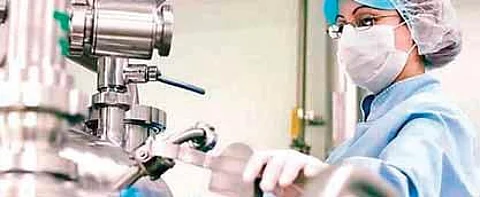

HYDERABAD : The healthcare industry, as we have seen, is recession proof. And the same can be said of the pharmaceutical sector too. It may be ironic, but pandemics offer an even meatier opportunity for both the healthcare sector in general and pharma companies in particular.
The Covid-19 pandemic was supposed to be no different, but during the Great Lockdown — where country after country has shut borders — pharma companies are getting a taste of the bitter pill for once.
If raw material shortages, supply chain disruptions and lack of packaging material had hit pharma production until now, the movement of migrant labourers to hometowns could pose another challenge in the form of inadequate manpower for producers. Currently, only a few big players like Sun Pharmaceuticals, Cadila Pharmaceuticals, Dr Reddy’s Laboratories, and Aurobindo are operating at capacities upwards of 60 per cent. With the graded lifting of the lockdown underway, and several restrictions having been eased, companies are hoping for normalcy to return sooner than later.
According to P Eshwar Reddy, executive director, Bulk Drug Manufacturers’ Association (BDMA), companies in Telangana (which is a hub for bulk drugs) are operating units at 50 per cent of capacity due to the limited movement of both employees and materials. Similarly, in Baddi, where 35-40 per cent of the nation’s pharma output comes from, most units were operating at less than half their capacity until recently.
To reduce import dependency on bulk drugs and other raw materials, the BDMA wants the government to develop three mega bulk drug parks in partnership with states and provide `1,000 crore grants-in-aid to states for each park over the next five years. Such a move will reduce the manufacturing cost of bulk drugs and dependency on other countries.
Besides, it has also sought financial incentives for eligible manufacturers of 53 critical bulk drugs for six years, based on incremental sales over base year FY20. “Usually, Indian pharma exports during February and March are quite brisk. Having seen the good pace of exports in the first three quarters and price stabilisation in the United States, it was estimated that exports would reach $22 billion in FY20,” said Udaya Bhaskar, Director General, Pharmexcil.
According to the Trade Promotion Council of India, the country imports about 85 per cent of its total requirement of APIs from China. Similarly, 67 per cent of our total imports of bulk drugs in FY19 came from China, followed by the US and Italy, according to the Directorate General of Commercial Intelligence and Statistics.
India’s dependency on China for bulk drugs is simply because they are 20-30 per cent cheaper than locally produced versions. But, Edelweiss Securities noted that due to Covid-19-caused supply-side disruptions, the sector’s earnings will fall by 10-15 per cent. HDFC Securities, meanwhile, maintained that the Indian pharma segment has been relatively resilient to the Covid disruption and is poised to gain from favourable currency tailwinds and stable business outlook.
Meanwhile, the upshot is that Indian companies are receiving bulk orders for anti-malaraia drugs like chloroquine and hydroxychloroquine, which are undergoing clinical trials for Covid-19 treatment. With export restrictions being lifted on essential drugs like pencillin, the pie is only growing bigger. As if on cue, according to a Bloomberg report, India has also identified and prioritized production of 53 raw materials and APIs as part of its China-plus-one policy to fill in the gaps in the supply of affordable medicines.